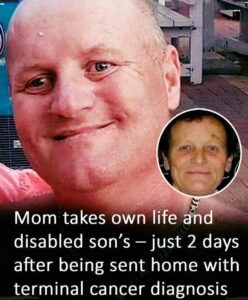The Tragic Story of Shirley Nunn: When Caregiving Becomes an Unbearable Burden A Mother’s Silent Struggle

In October 2021, Shirley Nunn received a diagnosis that shattered her world—she had terminal cancer. But even as she faced her own mortality, her deepest fear wasn’t death. It was what would happen to her son, Steven, once she was no longer there to care for him.
Steven’s life had already been drastically altered at age 11 when a traumatic accident left him in a coma and caused irreversible brain damage. Despite undergoing multiple operations, he was left with significant lifelong conditions, including cerebral palsy, epilepsy, limited mobility, and severe cognitive impairments. After her husband’s death from cancer, Shirley had taken on the role of Steven’s primary caregiver, receiving only minimal assistance from adult social care services.
A Failing Safety Net
Shirley’s illness progressed at an alarming rate. Initially diagnosed with stage three lung cancer, it quickly metastasized to her brain, spine, and pelvis. Even as her condition worsened, she continued to care for Steven in their home.
A later Domestic Homicide Review uncovered that Shirley had shown clear signs of psychological distress and suicidal ideation in her final months—yet professionals missed key chances to intervene and provide crucial mental health care.
“The seriousness of her diagnosis should have triggered urgent, comprehensive support for both her physical and emotional needs,” the review emphasized. “Unfortunately, that urgency was not fully recognized.”
Just two days after she was discharged from the hospital, police responded to a call from her sister. Inside Shirley’s home, they found both her and Steven deceased. Heartbreakingly, the date marked the second anniversary of her husband’s passing from cancer.
A Desperate Act, A Systemic Failure
Investigators concluded that Shirley had always put Steven’s well-being ahead of her own. In her final moments, overwhelmed and without a clear plan for her son’s future care, she may have felt hopeless and isolated—believing this tragic outcome was the only remaining option.
This devastating event exposes deep cracks in the systems meant to protect vulnerable families. What might have changed if mental health professionals had acted sooner? Could this loss have been prevented with better support and planning?
Shirley’s experience forces us to confront an uncomfortable truth: while physical health is often the focus, the psychological toll on caregivers—especially those dealing with terminal illness—is frequently ignored. Her story urges us to reevaluate how we treat and support full-time caregivers who are navigating impossible choices.
So we must ask: Are we doing enough to help people like Shirley feel seen, supported, and safe? Or are we still leaving them to face their darkest hours alone?